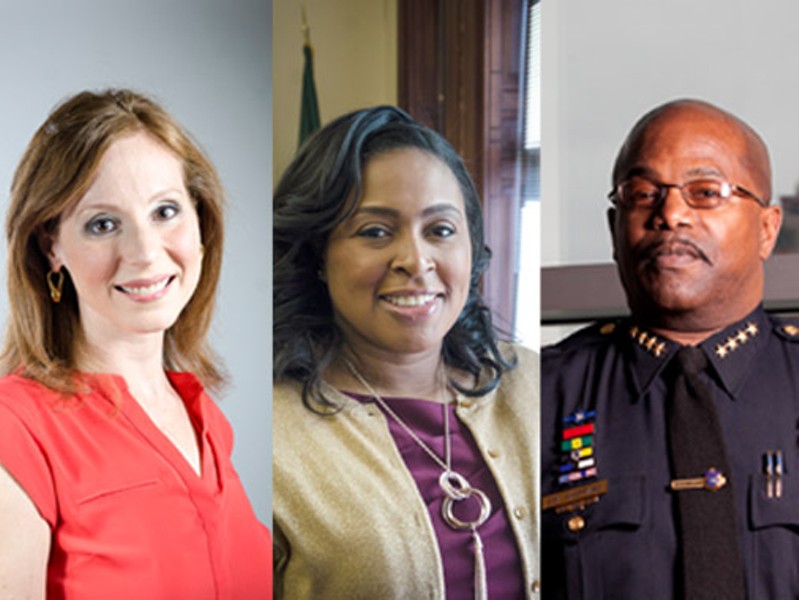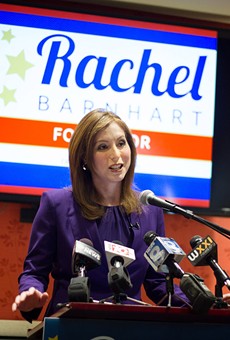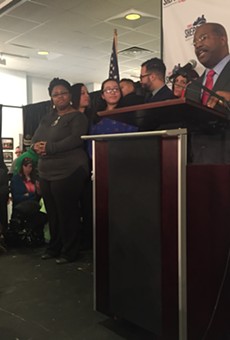There’s no rest for the weary.
Many of us haven’t gotten over the national election yet, and we’re about to enter another big campaign: a Democratic primary for Rochester mayor. While Lovely Warren hasn’t announced that she’ll run for a second term, it’s almost certain that she will. And she’ll face at least two opponents: County Legislator Jim Sheppard – a former Rochester police chief – and former television reporter and anchor Rachel Barnhart.
Primaries can be healthy, for political parties and for the public. But I’m very, very worried about this one. On a smaller scale, it could become as emotional and as divisive as what we’ve just lived through. And as racially tinged.
Democratic Party squabbles are nothing new. They seem to be part of the basic character of the party. But with the Trump administration preparing to undercut support for the most vulnerable Americans – many of whom live in urban communities like Rochester – and with Republicans apparently willing to support him, a strong Democratic Party is essential at every level: federal, state, and local.
Democrats will have to try to protect the rights and services we have and find ways to replace what Republican-led governments remove. They’ll have to find a way to engage the broader public in that fight.
That will take leadership, and it will take strength and unity. The last thing this community needs right now is major division among Rochester Democrats. But the division is there. Worse still: it’s predominantly along racial lines.
The racial division may not be apparent to the average Democratic voter, but it’s there. It goes back many years. And it was intensified and brought to a head four years ago, in the Democratic primary that led to Warren’s election as mayor.
In that primary Warren, who is black, challenged the incumbent mayor, Tom Richards, who is white. Warren was backed by her mentor, State Assemblymember David Gantt, and many other local black Democrats. Richards’ supporters included southeast and northwest Democratic leaders, most of them white.
When Warren won, some of her opponents launched an ill-advised independent bid for Richards in the general election. I say “ill-advised” despite having applauded that campaign editorially and having endorsed Richards in that election. In retrospect, I believe that was a mistake, for me, and for the dissident Democrats.
That campaign did great damage to the local Democratic Party, which was already weak, was having trouble raising money, and seemed helpless in the face of a powerful Monroe County Republican organization. Worse, it added to the racial divide in this community. It was a slap in the face of the black Rochesterians who had voted for Warren. It clearly offended black Democratic leaders, activists, and other Warren supporters, and it heightened the serious mistrust between black and white factions of the party.
Now we have the makings of another Democratic primary. And while both Sheppard and Warren are black, many of Sheppard’s backers are the same white Democrats who backed Richards four years ago.
The racial division hasn’t been intentional. The people supporting Sheppard aren’t doing it out of racist animosity. I know some of them, several of them extremely well. Some have fought hard for racial justice for decades and continue to do so.
And there’s absolutely no reason to think that Rachel Barnhart, who is white, is challenging Warren and Sheppard because of their race. (Barnhart’s supporters include Scott Gaddy, an African American who was once a key Warren supporter.)
All three candidates will likely focus on issues in the coming campaign. But it’s a good bet that lying beneath the surface will be the issue of race, no matter how the candidates conduct themselves.
This will be a hard-fought primary election, as the last one was. So far, Warren has some big advantages. She already has substantially more money for a campaign. And she has significant name recognition and visibility. While Sheppard served as Rochester’s police chief for three years, Warren has been in the public eye longer. She was elected to City Council in 2007 and was elected its president in 2010. And as the incumbent mayor, she’ll continue to be able to get more frequent media coverage that Sheppard and Barnhart can.
Warren also has some impressive backers, if the names listed on the invitation to the February 25 Mayor’s Ball – an important fundraiser – is any indication.
Wegmans’ CEO Danny Wegman is honorary chair of the event.
State Assemblymember (and former Monroe Democratic chair) Joe Morelle; developers David Christa, Brett Costello, David Flaum, Ken Glazer, Nelson Leenhouts, Bob Morgan, and the Rainaldi family; Nazareth College President Daan Braveman; Rob and Richard Sands of Constellation Brands; Red Wings CEO Naomi Silver; Klein Steel CEO Joe Klein; ICS Telecom founder IC Shah; Complemar CEO Christine Whitman: all are lending their names (and presumably their fund-raising support and connections) to Lovely Warren’s re-election bid.
None of that guarantees Warren a win, of course. This will be a primary, not a general election. Only Democrats will be able to vote – and only a small percentage of people in all parties vote in their primaries, usually the most committed.
Massive, expensive advertising may not sway those voters. Television ads would be a waste. There’ll be lots of direct mail to the Prime Dems – the Democrats who usually turn out for those elections. But old-fashioned, door-to-door campaigning and phoning, by the candidates and their supporters, will be critically important.
Sheppard also has some important supporters, including numerous unions that are not Warren fans. Construction unions, for instance, are upset with her over her actions related to modernizing Rochester school buildings. And the police union has been upset over police district reorganization and staffing levels. While many union members may live outside the city and won’t be able to vote, they can give money, staff phone banks, attend rallies, and go door to door.
And Barnhart, who was on local television for 17 years and has had a popular online blog, has substantial name recognition. She may not be on TV now, but a lot of people remember her, or at least know her name.
This community has enormous challenges. It’s good for the city, and good for voters, to have elections that force candidates to talk about those challenges and outline how they hope to help overcome them. But right from the outset, this primary is intensifying the rift among local Democrats, possibly destroying what is left of their party.
And while I’m sure none of the three candidates intend this, I don’t see how the campaign can fail to widen the city’s racial division.
I don’t have a favorite in this campaign. I won’t have a favorite until the editorial staff here has interviewed all of the candidates and observed their campaigns. If Sheppard and Barnhart are able to document clear shortcomings of Warren and her administration, fine. If they’re able to show how they’ll do better, fine. If they can show how they can heal the racial division in the party and in the community, fine. But I’m worried.
This is a time when the Democratic Party and progressive third parties need to be building strength, to protect government funding and services that Americans need, protect human rights, protect the environment, and help build a safer, healthier, more stable and peaceful world. The opportunity is there, as the enthusiasm of protesters around the country is showing.
This is also a time when the Democratic Party and progressive third parties need to be building for the future, maintaining and strengthening the interest and commitment of young adults and other new or disillusioned voters.
That work has to start locally. Being united for national elections – as many local Democrats were in the presidential campaign – is important. But we have huge problems at home, and solving them will require unity and strength in local and state parties. Progressives need to increase their representation in Albany, where government action can provide protections that the Trump Administration and the Republican Congress have promised to weaken at the federal level.
Locally, Democrats and other progressives can press county government to help strengthen the city and better fund services for the county’s poor. And they can work to elect county officials who will form a creative, dynamic, progressive county government.
There is enough talent, energy, and devotion to the community in all factions of the local Democratic Party that if they were united, they could accomplish great things. Instead, Monroe County Democrats are getting ready to tear their party further apart. And if they’re not extremely careful, they’ll heighten racial tension and animosity in the community.
I hope everybody involved knows what they’re doing, the risks they’re taking, and the damage they could inflict on the community.
Many of us haven’t gotten over the national election yet, and we’re about to enter another big campaign: a Democratic primary for Rochester mayor. While Lovely Warren hasn’t announced that she’ll run for a second term, it’s almost certain that she will. And she’ll face at least two opponents: County Legislator Jim Sheppard – a former Rochester police chief – and former television reporter and anchor Rachel Barnhart.
Primaries can be healthy, for political parties and for the public. But I’m very, very worried about this one. On a smaller scale, it could become as emotional and as divisive as what we’ve just lived through. And as racially tinged.
Democratic Party squabbles are nothing new. They seem to be part of the basic character of the party. But with the Trump administration preparing to undercut support for the most vulnerable Americans – many of whom live in urban communities like Rochester – and with Republicans apparently willing to support him, a strong Democratic Party is essential at every level: federal, state, and local.
Democrats will have to try to protect the rights and services we have and find ways to replace what Republican-led governments remove. They’ll have to find a way to engage the broader public in that fight.
That will take leadership, and it will take strength and unity. The last thing this community needs right now is major division among Rochester Democrats. But the division is there. Worse still: it’s predominantly along racial lines.
The racial division may not be apparent to the average Democratic voter, but it’s there. It goes back many years. And it was intensified and brought to a head four years ago, in the Democratic primary that led to Warren’s election as mayor.
In that primary Warren, who is black, challenged the incumbent mayor, Tom Richards, who is white. Warren was backed by her mentor, State Assemblymember David Gantt, and many other local black Democrats. Richards’ supporters included southeast and northwest Democratic leaders, most of them white.
When Warren won, some of her opponents launched an ill-advised independent bid for Richards in the general election. I say “ill-advised” despite having applauded that campaign editorially and having endorsed Richards in that election. In retrospect, I believe that was a mistake, for me, and for the dissident Democrats.
That campaign did great damage to the local Democratic Party, which was already weak, was having trouble raising money, and seemed helpless in the face of a powerful Monroe County Republican organization. Worse, it added to the racial divide in this community. It was a slap in the face of the black Rochesterians who had voted for Warren. It clearly offended black Democratic leaders, activists, and other Warren supporters, and it heightened the serious mistrust between black and white factions of the party.
Now we have the makings of another Democratic primary. And while both Sheppard and Warren are black, many of Sheppard’s backers are the same white Democrats who backed Richards four years ago.
The racial division hasn’t been intentional. The people supporting Sheppard aren’t doing it out of racist animosity. I know some of them, several of them extremely well. Some have fought hard for racial justice for decades and continue to do so.
And there’s absolutely no reason to think that Rachel Barnhart, who is white, is challenging Warren and Sheppard because of their race. (Barnhart’s supporters include Scott Gaddy, an African American who was once a key Warren supporter.)
All three candidates will likely focus on issues in the coming campaign. But it’s a good bet that lying beneath the surface will be the issue of race, no matter how the candidates conduct themselves.
This will be a hard-fought primary election, as the last one was. So far, Warren has some big advantages. She already has substantially more money for a campaign. And she has significant name recognition and visibility. While Sheppard served as Rochester’s police chief for three years, Warren has been in the public eye longer. She was elected to City Council in 2007 and was elected its president in 2010. And as the incumbent mayor, she’ll continue to be able to get more frequent media coverage that Sheppard and Barnhart can.
Warren also has some impressive backers, if the names listed on the invitation to the February 25 Mayor’s Ball – an important fundraiser – is any indication.
Wegmans’ CEO Danny Wegman is honorary chair of the event.
State Assemblymember (and former Monroe Democratic chair) Joe Morelle; developers David Christa, Brett Costello, David Flaum, Ken Glazer, Nelson Leenhouts, Bob Morgan, and the Rainaldi family; Nazareth College President Daan Braveman; Rob and Richard Sands of Constellation Brands; Red Wings CEO Naomi Silver; Klein Steel CEO Joe Klein; ICS Telecom founder IC Shah; Complemar CEO Christine Whitman: all are lending their names (and presumably their fund-raising support and connections) to Lovely Warren’s re-election bid.
None of that guarantees Warren a win, of course. This will be a primary, not a general election. Only Democrats will be able to vote – and only a small percentage of people in all parties vote in their primaries, usually the most committed.
Massive, expensive advertising may not sway those voters. Television ads would be a waste. There’ll be lots of direct mail to the Prime Dems – the Democrats who usually turn out for those elections. But old-fashioned, door-to-door campaigning and phoning, by the candidates and their supporters, will be critically important.
Sheppard also has some important supporters, including numerous unions that are not Warren fans. Construction unions, for instance, are upset with her over her actions related to modernizing Rochester school buildings. And the police union has been upset over police district reorganization and staffing levels. While many union members may live outside the city and won’t be able to vote, they can give money, staff phone banks, attend rallies, and go door to door.
And Barnhart, who was on local television for 17 years and has had a popular online blog, has substantial name recognition. She may not be on TV now, but a lot of people remember her, or at least know her name.
This community has enormous challenges. It’s good for the city, and good for voters, to have elections that force candidates to talk about those challenges and outline how they hope to help overcome them. But right from the outset, this primary is intensifying the rift among local Democrats, possibly destroying what is left of their party.
And while I’m sure none of the three candidates intend this, I don’t see how the campaign can fail to widen the city’s racial division.
I don’t have a favorite in this campaign. I won’t have a favorite until the editorial staff here has interviewed all of the candidates and observed their campaigns. If Sheppard and Barnhart are able to document clear shortcomings of Warren and her administration, fine. If they’re able to show how they’ll do better, fine. If they can show how they can heal the racial division in the party and in the community, fine. But I’m worried.
This is a time when the Democratic Party and progressive third parties need to be building strength, to protect government funding and services that Americans need, protect human rights, protect the environment, and help build a safer, healthier, more stable and peaceful world. The opportunity is there, as the enthusiasm of protesters around the country is showing.
This is also a time when the Democratic Party and progressive third parties need to be building for the future, maintaining and strengthening the interest and commitment of young adults and other new or disillusioned voters.
That work has to start locally. Being united for national elections – as many local Democrats were in the presidential campaign – is important. But we have huge problems at home, and solving them will require unity and strength in local and state parties. Progressives need to increase their representation in Albany, where government action can provide protections that the Trump Administration and the Republican Congress have promised to weaken at the federal level.
Locally, Democrats and other progressives can press county government to help strengthen the city and better fund services for the county’s poor. And they can work to elect county officials who will form a creative, dynamic, progressive county government.
There is enough talent, energy, and devotion to the community in all factions of the local Democratic Party that if they were united, they could accomplish great things. Instead, Monroe County Democrats are getting ready to tear their party further apart. And if they’re not extremely careful, they’ll heighten racial tension and animosity in the community.
I hope everybody involved knows what they’re doing, the risks they’re taking, and the damage they could inflict on the community.


